Asking Basic Questions
StatMuse is great; and like other great experiences in life, it’s even better if you know what you’re doing.
With that in mind, we present the first entry in our StatMuse MLB tutorial series to help you get a grasp of the many aspects and abilities of the StatMuse platform, starting with asking questions about basic stats. The MLB platform works similarly to the NBA version, but even seasoned StatMuse veterans may need a few tips and suggestions for getting the best results from baseball stats that stretch back as far as 1876.
(Stats included are accurate as of the date of publication. Results may have since changed.)
Select the Right Sport
With multiple sports now available, it’s important that you select which sport you want to search since it’s really hard to hit a home run in the NBA.
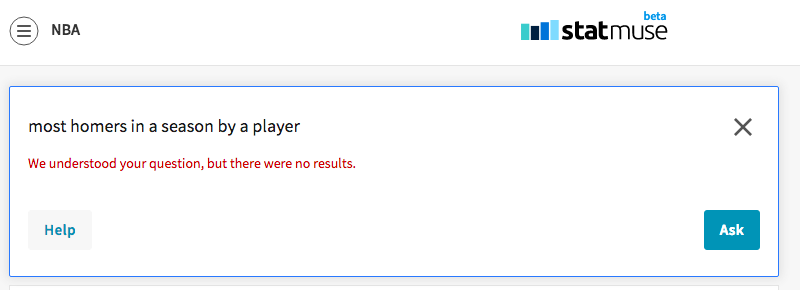
Our homepage will default to a sport that is in-season, but if you ever need to switch sports, simply click the toggle in the upper left-hand corner.
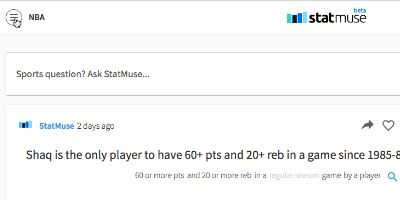
Ask a Question — Be Specific
StatMuse is like a search engine in that you type in a question and it returns an answer. However, instead of sending you to a webpage that includes the answer, you get it directly with an instant visualization. It’s not Jeopardy, so you don’t have to phrase it in the form of a question, just type in what you’re looking for. However, keep in mind that specificity is the foundation of a good StatMuse search. It’s not a Kubrick film; it shouldn’t be left open to interpretation. Be as specific as possible in your searches to get the most accurate answers.
Player vs. Team Stats
Suppose you want to know who has the most hits in a game, so you search “Most hits in a game?” The problem with that is StatMuse doesn’t know based on that query whether or not you want to know “Most hits by a player in a game” or “Most hits by a team in a game.” StatMuse assumes you meant “Most hits by a player in a game” and adds that text to your question to show you the results being returned:
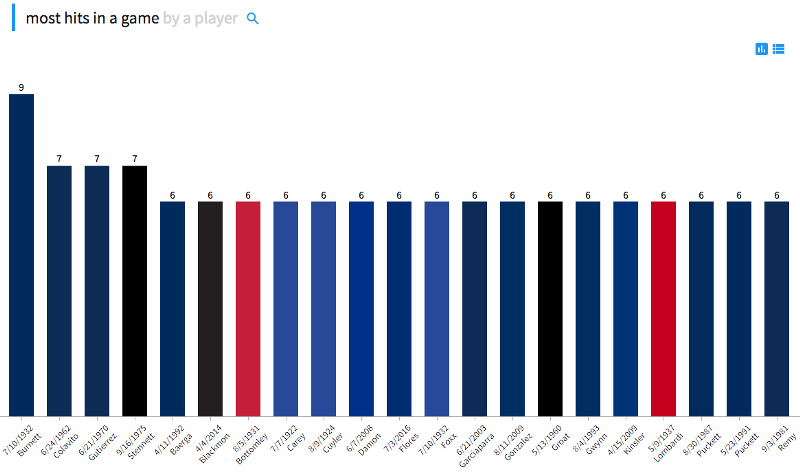
Johnny Burnett had nine hits in a game? Who is that? How is that even possible? Use the data table below the graph to get more stats about the returned results. There you can see that not only did Johnny collect nine hits, but he did it in 11 at-bats for an .818 average with two RBI and four runs scored.

To get the most hits in a game by a team, simply tweak your search to “Most hits in a game by a team.”
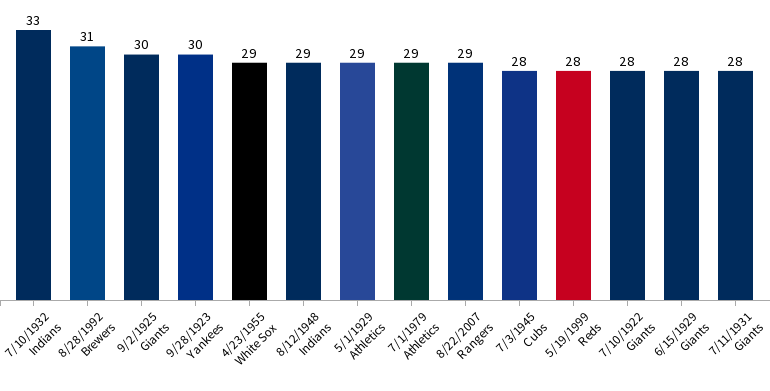
Yet, these complications can be avoided by asking questions with a proper grammatical structure. StatMuse isn’t Jeopardy, so you don’t have to phrase it in the form of a question, but it generally helps to construct your StatMuse questions like you would any other. So asking something like “Who scored the most runs in a game?” or “Which team scored the most runs in a game?” can help return more accurate answers.
You can even ask about stats for specific players, specific teams or specific players on specific teams. For example, you can see which player has hit the most home runs for the Red Sox:
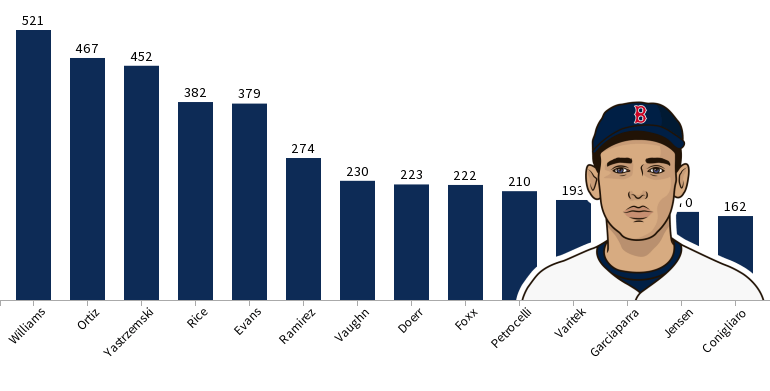
Here you see that in Boston’s illustrious history, the legendary Ted Williams leads the franchise in career home runs. You’ll also no doubt notice Ted Williams’ beautifully-illustrated profile — a new feature in the MLB product. Head shots of a few notable current players and legends will appear when they sit atop the leaderboard of a specific search. We’ll continue to add player illustrations and if we ever support the question “Which player has the most heads frozen post mortem,” we’ll add a nice blue-ish Ted Williams profile since he’ll definitely be the leader in that category.
Same Name, Different Stats
Suppose you want to know the most hits Manny Ramirez ever had in a game, so you type “What are the most hits in a game by Ramirez?” You’ll see that your question will return answers for more than just Manny because there have been quite a few players with the last name Ramirez. Their stats will also filter in since a first name wasn’t specified in the search:
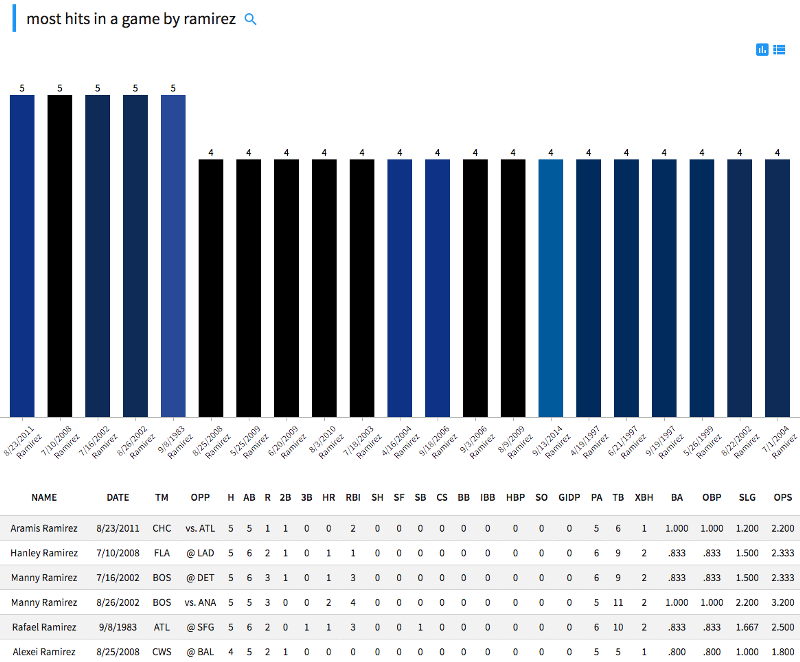
So we get Aramis, Hanley, Rafael and Alexei mixed in with Manny; but since we want to know about “Manny being Manny,” not “Aramis being Aramis,” let’s specify Manny in the question:
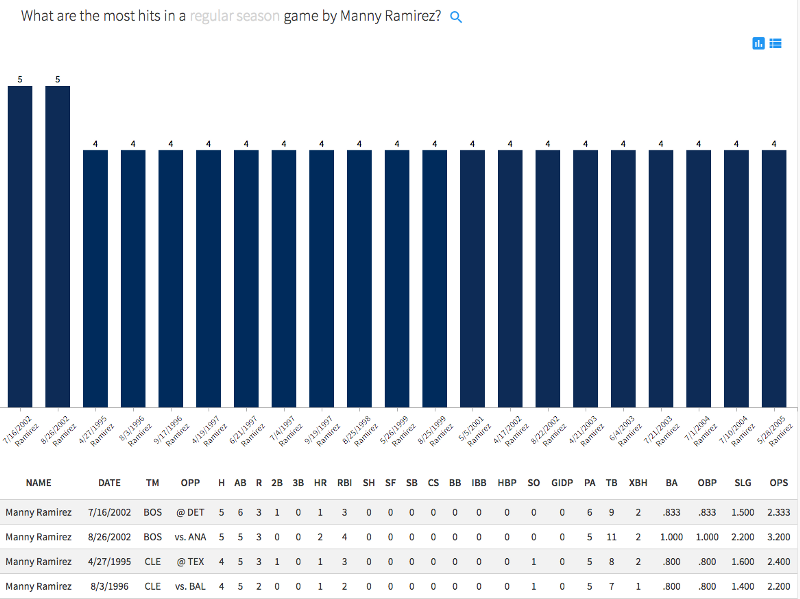
Pitchers vs. Batters
Baseball players are split into two basic categories — pitchers and batters. This can get a little confusing since each side is assigned stats with the exact same name. For example, you can ask “Who had the most strikeouts in a season?” but StatMuse won’t know exactly what you mean. Do you want to know which batter struck out the most times in a season or which pitcher struck out the most batters in a season? If a stat category is shared among both pitchers and batters, do us a favor and tell us which one you need and we’ll hook you up.
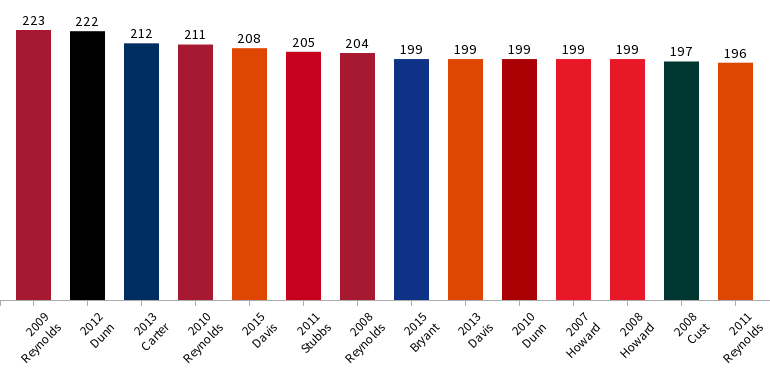
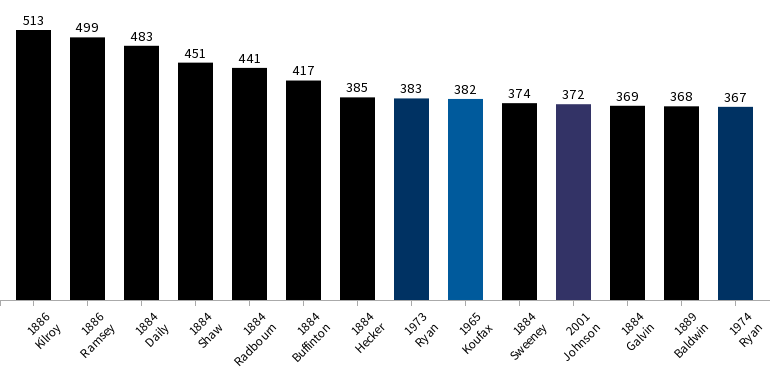
Dear lord, what is going on in that graph? 513 strikeouts in 1886 by Matt Kilroy? Is that for real? Baseball has been around for a long, long time and the game has changed greatly. Luckily for anyone needing data from the 19th century, StatMuse has got you covered. However, if you skew a bit more modern in your stat needs, simply set a year filter to see players with recognizable names:
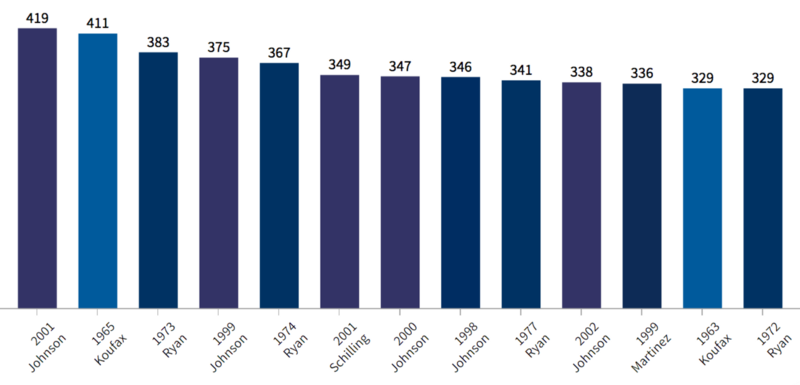
Know Your Limitations
Stat limitations will come in handy for more than just scrubbing out players who could’ve fought in the Civil War. Some answers will be technically correct, but still not exactly what you need. For example, did you know Marv Throneberry has highest batting average in a season by a Yankees first baseman?
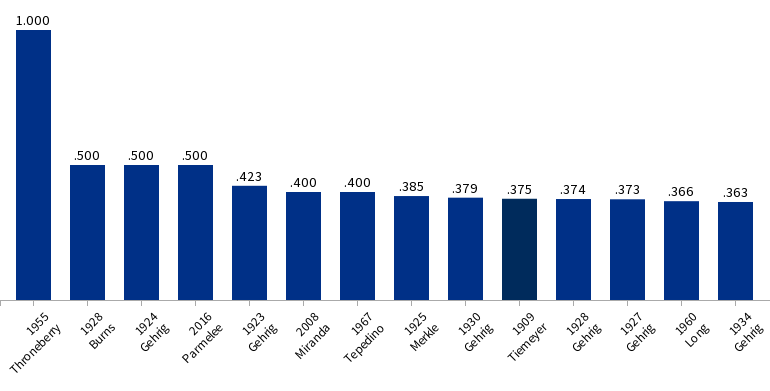
Numbers don’t lie, Throneberry hit 1.000 in 1955, more than any other Yankees first baseman in a season. It’s a fact. But if you look more closely at the data table, you’ll see that Marv’s historic numbers were put up in just two measly at-bats:

Two at-bats does not a Yankees legend make. A lot of questions about categories that are ranked by average will have outliers that don’t really give an accurate depiction of that stat’s true leader. To get a better return, limit the results by something that indicates a player was active for a full season, like games played or at-bats. For this example, if you give your question a minimum of 500 at-bats, you’ll knock Marv off his throne.
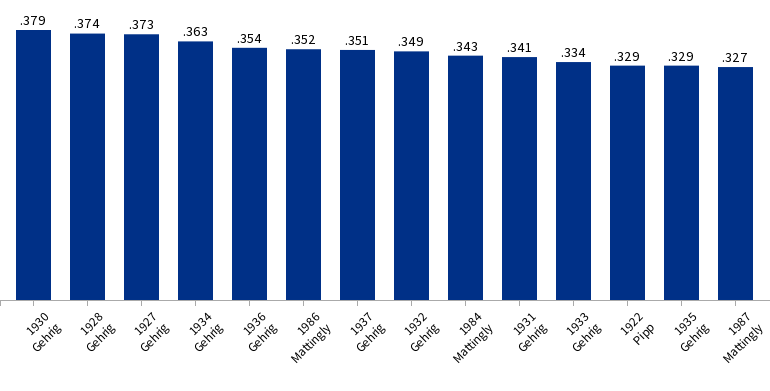
Abbreviate Approp.
StatMuse can easily interpret abbreviations to make asking questions about stats as easy as possible. You can save valuable seconds by entering “What are the most SB in a season by the Colorado Rockies?” instead of typing out “What are the most stolen bases in a season by the Colorado Rockies?” But just like you can get an unwanted response by referring to a “Ms.” as a “Mrs.” you can also get unwanted responses by using the wrong abbreviations in StatMuse.
For example, if you want to know Clayton Kershaw’s career-high for batters faced in a season and enter “What are the most BF in a season by Clayton Kershaw?” you won’t get the results you want because “TBF” is the official abbreviation for the stat Total Batters Faced. You’ll need to use the abbreviation “TBF” to get the correct results.
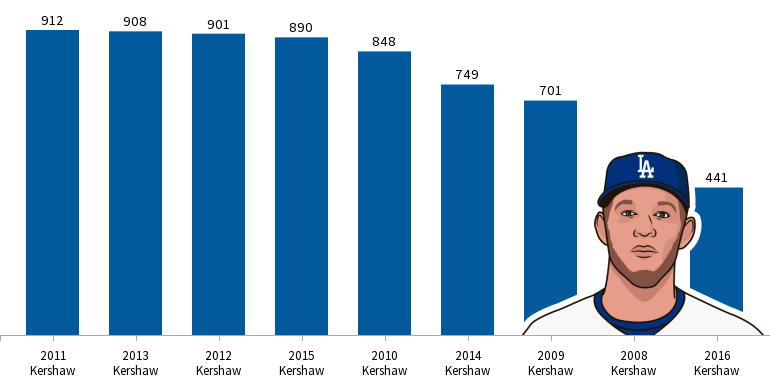
For a complete breakdown of every MLB stat that’s supported on StatMuse and the appropriate abbreviation for each, check our our MLB Statistics Glossary.
StatMuse Baseball Statistics Glossary
A listing of baseball stats that are searchable on StatMuseblog.statmuse.com
Dig Deeper
Now that you have the simple question down, let’s expand your statistical horizons with more complex dives.

Expanded Questions
You already know how to ask a simple question, but you can build onto a question to narrow down results. Start simple with a question about the player with the most doubles this season:
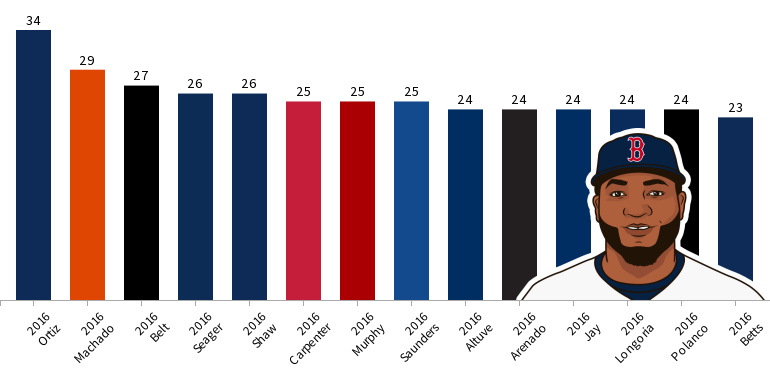
There’s Papi’s smiling face; but does Papi only get those doubles by bouncing balls around Fenway? Does Papi still smile on the road? Let’s find out by channeling our inner Jack Kerouac and add “on the road” to the question:
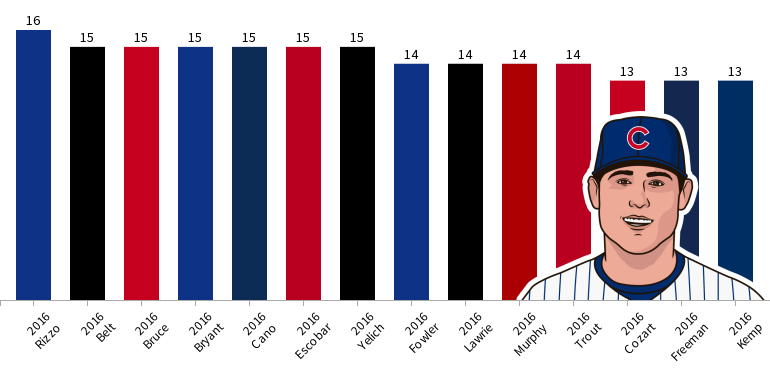
Yep, looks like Ortiz does his doubling at home while Anthony Rizzo does his damage away from the friendly confines of Wrigley Field. So if Ortiz doubles so well at Fenway, which other players use their home field advantage? More so, which ones give Papi a taste of his own medicine by doubling at home against the Red Sox? Switch it up a bit with “at home against Boston.”
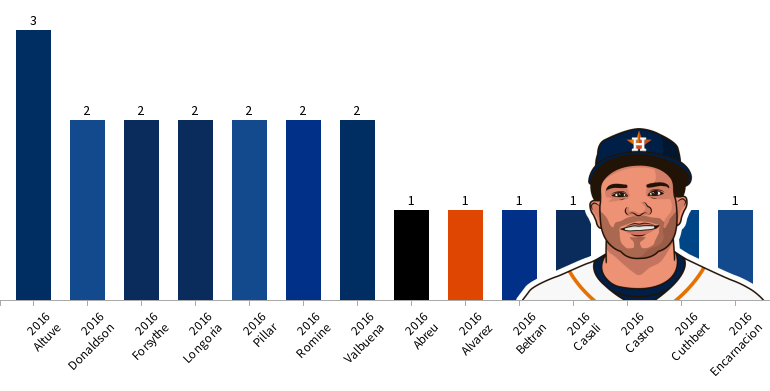
Jose Altuve again proving that big things come in small packages.
Multiple Variables
Sometimes it’s not enough to ask about just one stat at a time. So a player hit 50 homers in a season? So what? Did he have the highest batting average for a player with that many long balls? Those types of questions are easily answered by adding additional variables. If your life won’t be complete until you know the highest batting average by a player in a season with at least 50 homers, just ask. Type it out just like that.
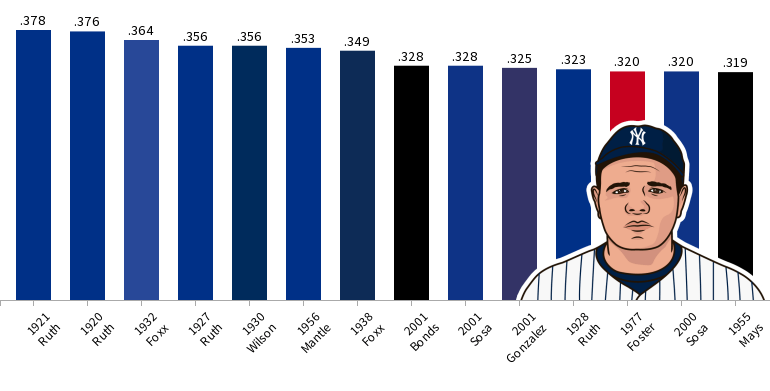

Try It Yourself
Now that you’ve seen some of the basic MLB questions you can ask in StatMuse, it’s time to put your knowledge into practice. Log in to StatMuse.com and try some of the above questions yourself. Or come up with your own questions.

If you’re still not quite ready to ask questions yourself, you can see some of the best answers shared recently on the homepage. If you need any help, click on the live chat icon in the bottom right-hand corner or send us a message on Twitter and we’ll answer any questions you may have.
Our MLB platform will continue to expand and we’ll add additional updates and tutorials to make sure you’re up-to-date on the latest StatMuse has to offer.

